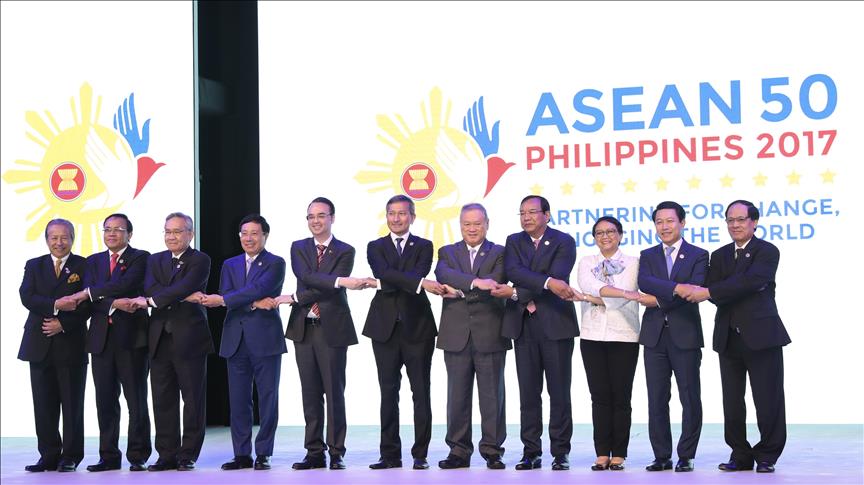ID :
457102
Sun, 08/06/2017 - 09:56
Auther :
Shortlink :
https://oananews.org//node/457102
The shortlink copeid
Southeast Asian nations body repeats North Korea stance

ZAMBOANGA CITY, Philippines
Foreign ministers of member states of Association of Southeast Asian Nations (ASEAN) on Saturday ignored Washington’s call to downgrade diplomatic ties with North Korea, choosing instead to reiterate its “grave concern” over regional tensions.
North Korea's intercontinental ballistic missile tests and an attempt to ease the tension in the disputed South China Sea had topped the agenda of the ASEAN foreign ministers’ meeting in Manila.
"We reiterate our support for the complete, verifiable and irreversible denuclearization of the Korean Peninsula in a peaceful manner, call for the exercise of self-restraint, and underscore the importance of creating conditions conducive for dialogue to de-escalate tensions," a statement released after the meeting read.
The statement came after Pyongyang’s recent testing of intercontinental ballistic missiles on July 4 and July 28, and previous ballistic missile launches and two nuclear tests in 2016.
"We strongly call upon the DPRK [North Korea], as a participant in the ASEAN Regional Forum [ARF], to positively contribute to realize the ARF's vision to maintain the Asia-Pacific as a region of lasting peace, stability, friendship and prosperity," the statement added.
North Korea, however, remains a participant of the ASEAN Regional Forum despite Washington's call to have Pyongyang be suspended from the security forum, which will be held in Manila on Monday.
Aside from the United Nations, the ARF was the only venue where the international community, including Southeast Asian countries, could reach North Korea, a Philippine official said recently.
Hours before the ASEAN minister's statement, the U.S. presented a draft UN resolution toughening sanctions on North Korea with a sweeping ban on exports of coal, iron, lead and seafood that could deprive Pyongyang of $1 billion in annual revenues.
The U.S. Secretary of State, Rex Tillerson, and North Korean Foreign Minister Ri Yong Ho both confirmed attendance at the ARF but there were no plans for a bilateral meeting.
Meanwhile, ASEAN diplomats endorsed the framework of the Code of Conduct (COC) of Parties in the South China Sea during the meeting on Saturday.
“The ministers endorsed the framework of the code of conduct for eventual adoption during the ASEAN-China Ministerial meeting on August 6,” Philippines’ Foreign Affairs spokesperson Robespierre Bolivar was quoted by Inquirer news as saying.
The draft copy of the COC was “not an instrument to settle territorial disputes or maritime delimitation issues” as it would be “rules-based,” containing “a set of norms to guide the conduct of parties and promote maritime cooperation in the South China Sea”.
The framework, which is believed to “cement” ASEAN and Chinese commitments to negotiate a binding code to ease tensions in the disputed waters, urges “respect for each other’s independence, sovereignty and territorial integrity in accordance with international law, and the principle of non-interference in the internal affairs of other states”.
Beijing claims almost all of the South China Sea, including a cluster of islands, reefs and atolls further south called the Spratlys; ASEAN members Brunei, Malaysia, the Philippines, Taiwan and Vietnam have overlapping claims on the waters.





